filmed in new york city, autumn 2006. summer 2008 finally got around to… thank you sim-chan and aka-chan and D-chan!
Posted by 丫 | reply »the horizon, the sea, yuko, the polar bear club
 [photo by ran, morning of the first day of the year, 2008]
[photo by ran, morning of the first day of the year, 2008]
like summer in fall


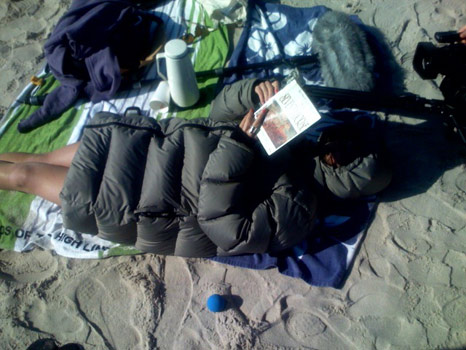
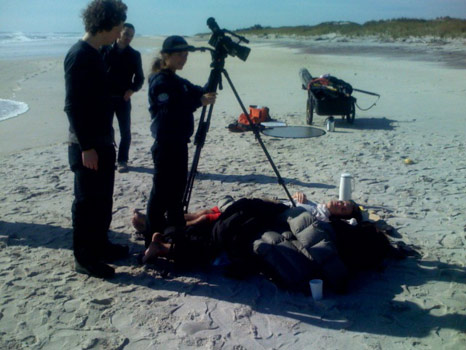
We made a movie. The actors had to act like it was a high summer day, but it was cold and above their heads birds were migrating south. What’s not apparent is invisible. Hopefully.
Posted by lucio | reply »d for dudley
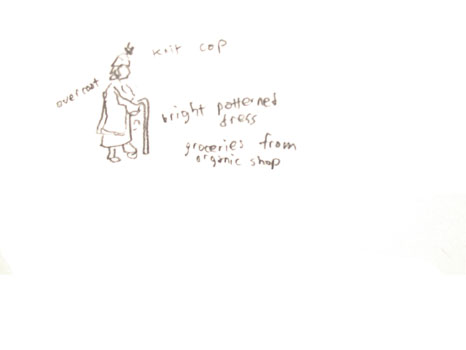 “so are you chinese or japanese?”
“so are you chinese or japanese?”
“i’m the chinese one.” “oh yes that’s right. i never remember which one. you two look alike.” “oh really, you think so?” “when are you moving out of here?” “well, technically i’m supposed to be gone already, but i just came back today to pick up a couple of things.” “oh. then you’re going back to china?” “yes.” “can you do me a favor? can you send a postcard? i’ve never been there.” “sure, that’s no problem.” “that’d be nice, thanks.” D is 91 years old and lives alone. She is Communist, curious about China and hopes one day to visit Japan. Her mailbox is stuck at the moment, but hopefully the postman will come soon and open it for her. Please send your postcards from China and many other places to: 253 East 10th Street, Apt. 16, New York, NY 10009, USA. (let us know if you do by logging in and writing a comment…thank you…)
Posted by 丫 | more »not-yet-expired activity
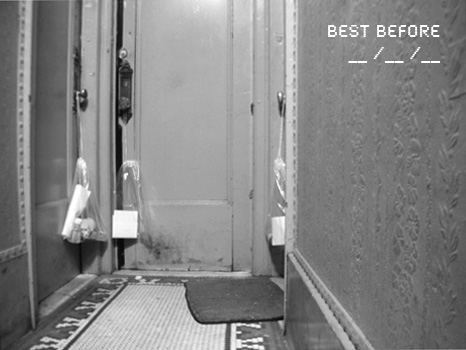 [readings for Best Before; this is what we’re up to; arnhem, boston and beijing in new york, August-October 2006]
[readings for Best Before; this is what we’re up to; arnhem, boston and beijing in new york, August-October 2006]
“The separation between a thing and its environment cannot be absolutely definite and clear-cut; there is a passage by insensible gradations from the one to the other; the close solidarity which binds all the objects of the material universe, the perpetuality of their reciprocal actions and reactions, is sufficient to prove that they have not the precise limits which we attribute to them. Our perception outlines, so to speak, the form of their nucleus; it terminates them at the point where our possible action upon them ceases, where, consequently, they cease to interest our needs. Such is the primary and the most apparent operation of the perceiving mind: it marks out divisions in the continuity of the extended, simply following the suggestions of our requirements and the needs of practical life.” —from Matter and Memory, Bergson
“We ought to think of the historical world according to this model. Why ask if history is made by men or by things, since it is obvious that human initiatives do not annul the weight of things, and the ‘force of things’ always acts through men? It is just this failure of analysis, when it tries to bring everything down to one level, which reveals history’s true milieu. There is no ‘last analysis,’ because there is a flesh of history in which (as in our own body) everything counts and has a bearing — the infrastructure, our idea of it, and above all the perpetual exchanges between the two in which the weight of things becomes a sign as well, thoughts become forces, and the balance of the two becomes events. It is asked, ‘Where is history made? Who makes it? What is this movement which traces out and leaves behind the figures of the wake?’ It is of the same order as the movement of Thought and Speech, and, in short, of the perceptible world’s explosion within us. Everywhere there are meanings, dimensions, and forms in excess of what each ’consciousness‘ could have produced, and yet it is men who speak and think and see. We are in the field of history as we are in the field of language or existence.”These transformations of private into public, of events into meditations, of thought into spoken words and spoken words into thought, this echo coming from everywhere makes it such that in speaking to others we also speak to ourselves, and speak of what exists. This swarming of words behind words, thoughts behind thoughts–this universal substitution is also a kind of stability.” —from Signs, Merleau-Ponty
“Take, for example, a small drawer, which the carpenter has made for the convenience of some housefold. With the passage of time, the actual form of this drawer is surpassed by time itself and, after the decades and centuries have elapsed, it is as though time had become solidified and had assumed that form. A given small space, which was at first occupied by the object, is now occupied by solidified time. It has, in fact, become the incarnation of a certain form of spirit. —from Kinkakuji, Mishima
Posted by secretary | reply »“oh…nothing” or “can i borrow your jams?”
to this day, nothing. like a to-do list, for you, upon arrival: “turn on the a/c, watch cable, cook, sleep, take long showers, walk around the neighbourhood, look out of the window, do yoga on the floor, read. see you next week, enjoy the house. love, lucio”.apologies for laughing too much, laughing being a sign of rudeness in many societies or situations, as in when the extremely overweight man sitting diagonally behind her shows extraordinary deftness in suddenly leaning back to ask “can i borrow your jams?” in slightly nasally voice and she responds equally deftly with a smooth pass of basket of assorted flavours of single portion jams. from in front of her, slightly on her right side, wicker basket of assorted flavours of single portion jams, to behind her, on her left, the man places the full wicker basket of assorted flavours of single portion jams next to his own wicker basket, which has only two jams left. at least as realistic as one can manage in memory, quite sur real, it becomes a consistent source of unnecessary laughter amongst the jam passer and her friend, who have deftly managed to translate it into chinese: 我å¯ä»¥å€Ÿä½ çš„jamså—? oh nothing.. from the press release for nothing, now at the schirn kunsthalle frankfurt: “Friedman shows 1,000 Hours of Staring (1992-1997), a sheet of paper stared at by the artist for one thousand hours, which marks an art process beyond the concept of the instantia tion of the stroke of genius or divine inspiration. The work reflects the labors of a persistence leading to nothing. When Friedman is asked if he really took the trouble of staring at the paper for one thousand hours and when he starts speaking about how he made a meditation of it and kept note of his working hours, this is almost too explicit and specific, curtailing the imagination. In the end, the white paper induces a reflection on time, which, however, is almost entirely left to the viewer by the artists. Nothing is only where you don’t see anything.”.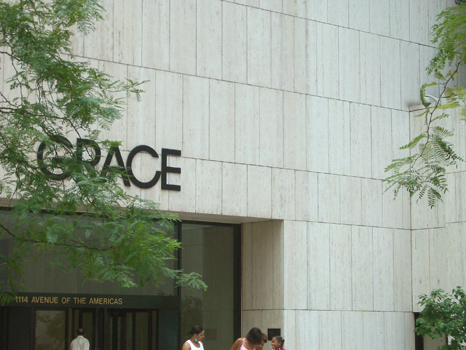 How, may i ask, may one stop seeing? The falafal stand man at 44th and 6th speaks better English than I do. And so does his mother, as she pulls out the fat wad of bills to give me change. chicken on rice. medium? Four dollars.Business is good today. Just behind, the Cotton Club has come to Grace, under a tent, they play jumping jack jive. There’s – mmbgh- -, there’s -st- -ard. I love it when they announce their names after solos, but today their microphones aren’t amped up enough, only chunky mumbling under the music. More black people take chairs up front. more white construction workers with sunglasses and bandannas sit on the ledge at the back. And when did the gypsies come to New York? Three of them each take a section of the square, each holding a sign in their hands telling how many children they have and dire looks on their faces. She has a black handbag creased flat under her arm, as if it came from the box. That old box. She talks to the man with big dreads concealed under bulbous knit cap, an unmoving black fishbowl attached to his shaking head. A stern almost-frown for the dejected, almost-sexy gypsy woman.Grace security arrives. Three gypsy women walk away with slow, almost-sexy lumbering steps under long skirts. Another man says something to the security guard, who watches the women steadfastly to make sure they leave Grace. You feel he is yelling in her ear, he is bent towards her in a yelling sort of way, though you hear but the softest murmur above the big band. You are only a few feet away.To see someone yelling but hear nothing.Behind the giant potted amaryllises, Asian woman takes a photo of Cotton Club. She blocks the path for red-haired fashion associate, who carries in her hands large presentation boards for the upcoming season. Red-haired fashion associate stops abruptly and rolls her eyes until Asian woman notices her and moves aside. The presentation boards move clumsily but quickly into 1114 avenue of the americas, otherwise known as the Grace building. Baudrillard never had it this good. It’s lunch hour.
How, may i ask, may one stop seeing? The falafal stand man at 44th and 6th speaks better English than I do. And so does his mother, as she pulls out the fat wad of bills to give me change. chicken on rice. medium? Four dollars.Business is good today. Just behind, the Cotton Club has come to Grace, under a tent, they play jumping jack jive. There’s – mmbgh- -, there’s -st- -ard. I love it when they announce their names after solos, but today their microphones aren’t amped up enough, only chunky mumbling under the music. More black people take chairs up front. more white construction workers with sunglasses and bandannas sit on the ledge at the back. And when did the gypsies come to New York? Three of them each take a section of the square, each holding a sign in their hands telling how many children they have and dire looks on their faces. She has a black handbag creased flat under her arm, as if it came from the box. That old box. She talks to the man with big dreads concealed under bulbous knit cap, an unmoving black fishbowl attached to his shaking head. A stern almost-frown for the dejected, almost-sexy gypsy woman.Grace security arrives. Three gypsy women walk away with slow, almost-sexy lumbering steps under long skirts. Another man says something to the security guard, who watches the women steadfastly to make sure they leave Grace. You feel he is yelling in her ear, he is bent towards her in a yelling sort of way, though you hear but the softest murmur above the big band. You are only a few feet away.To see someone yelling but hear nothing.Behind the giant potted amaryllises, Asian woman takes a photo of Cotton Club. She blocks the path for red-haired fashion associate, who carries in her hands large presentation boards for the upcoming season. Red-haired fashion associate stops abruptly and rolls her eyes until Asian woman notices her and moves aside. The presentation boards move clumsily but quickly into 1114 avenue of the americas, otherwise known as the Grace building. Baudrillard never had it this good. It’s lunch hour.
